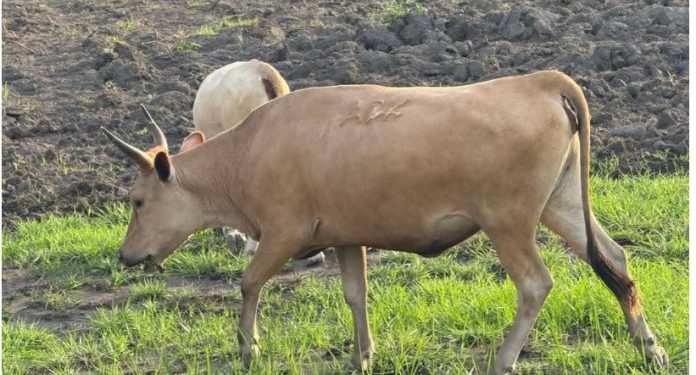By Hassan Osman Kargbo
Farmers in Makari Chiefdom- Northern Sierra Leone, are grappling with widespread crop destruction caused by stray cattle, sparking growing concerns about their livelihoods and the broader implications for national food security.
The crisis, which has intensified in recent weeks, comes at a critical time in the agricultural calendar, with crops such as rice, cassava, and vegetables nearing vital stages of development.
Local farmers say their farms have been repeatedly trampled and grazed by cattle allegedly owned by herdsmen, leaving behind vast stretches of ruined fields. The destruction threatens not only household incomes but also national efforts to boost food production under the Ministry of Agriculture and Food Security’s current agenda.
“We have invested heavily in land preparation, seeds, and fertilizers,” said Kadiatu Fofana, a subsistence farmer in Worreh Yeama Village. “But all of that is going to waste because the cattle roam freely and eat everything.”
Kadiatu’s sentiments are echoed across the chiefdom, where farming is the primary source of income for the majority of residents. Many farmers rely on seasonal harvests to sustain their families, pay school fees, and reinvest in the next planting season. The loss of crops at this stage, they say, is devastating.
“Farming is all we know,” lamented Mohamed Koroma, another farmer from Makari Gbanti. “When you wake up in the morning and see cows trampling over your young rice plants, you feel powerless. This is not just a loss of crops — it is a loss of hope.”
Farmers allege that the cattle are not being properly supervised by their owners, who are often absentee herdsmen. The situation has led to growing tensions between farming communities and livestock owners, with some warning of potential conflict if authorities fail to act swiftly.
In response to the growing crisis, local farmers are calling on both the district council and the central government to implement immediate measures to protect their farms. They are urging the Ministry of Agriculture and Food Security, as well as the Ministry of Internal Affairs, to enforce regulations on animal movement and strengthen community policing.
“The government needs to intervene now,” said Fatmata Conteh, a youth leader and farmer. “We need by-laws to restrict free-ranging cattle, and there should be penalties for herdsmen whose animals destroy farms. Without action, we are heading toward a food crisis.”
Agricultural experts have also weighed in, warning that continued destruction of food crops in rural farming districts could reverse recent gains in national food production. Sierra Leone has been working to reduce dependence on imported food and boost local farming under the “Feed Salone” initiative, but unchecked farm damage threatens that progress.
Efforts to get a comment from local authorities and representatives of the herding community have so far been unsuccessful. However, community leaders say dialogue and clear policies are essential to resolving the crisis and preventing further escalation.
As the rainy season continues, the farmers of Makari Chiefdom remain hopeful that their cries for help would be heard. Until then, they continue to watch their hard work vanish under the hooves of stray cattle, clinging to what’s left of their fields and faith.











